Dell XPS 15 Haswell Edition: QHD+ with a Refined Design
by Jarred Walton on March 6, 2014 7:00 AM ESTDell XPS 15: Battery Life
Our final set of tests is for battery life, and here again we have a change or two to make. I did run our 2013 battery tests, but for 2014 I’ve made some changes. First, our “Heavy” test will now use the Windows Video app to play back a 1080p MP4 movie – the use of MKV files basically resulted in lower battery life by a fairly large margin, and MP4 files are readily available. I’m also considering dumping the “Moderate” workload and just sticking with Light and Heavy testing, as well as including approximate gaming battery life. There’s this mentality of “more information is always better”, but by the same token more information and testing means more time and thus less timely reviews. In general, our Medium battery life results have been pretty consistent about falling half way between our Light and Heavy tests, and with the newly modified Heavy test it’s just one extra benchmark with questionable value.
With that said, we continue to test with LCD backlighting set to 200 nits, WiFi is enabled, and earbuds are connected to the headphone jack. For the XPS 15 QHD+ display, 200 nits ended up being at exactly 50% brightness, which makes things easy on us. I do like that Dell has relatively consistent steps between backlight levels of around 35 nits per 10%. Many laptops that I’ve used in the past have been far less granular, sometimes going from 300 nits at 100% to 200 nits at 90% and then 10 nits intervals from there down to 0%.
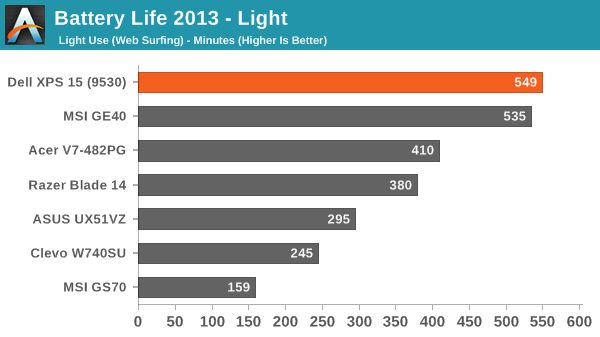
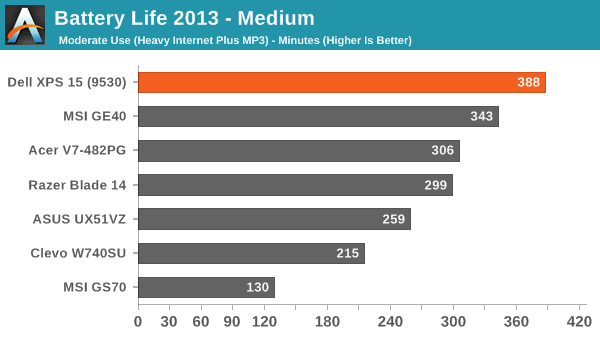
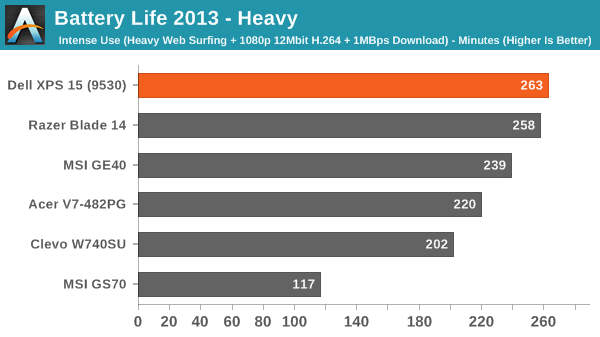
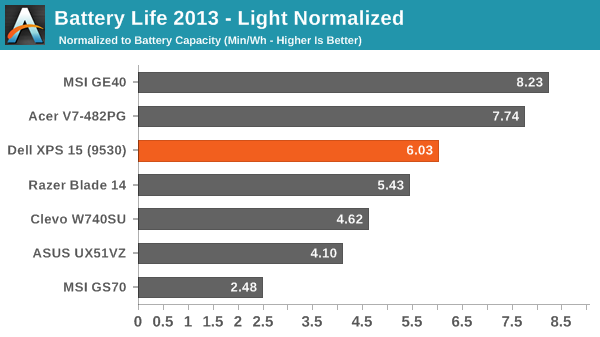
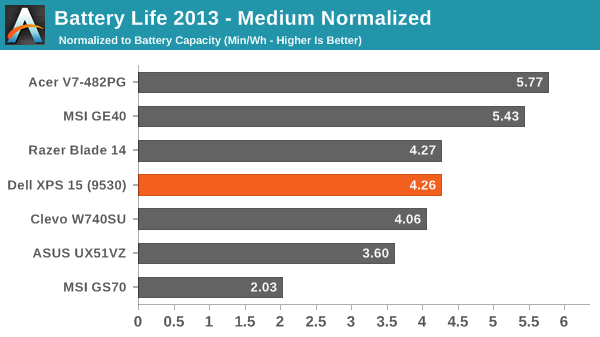
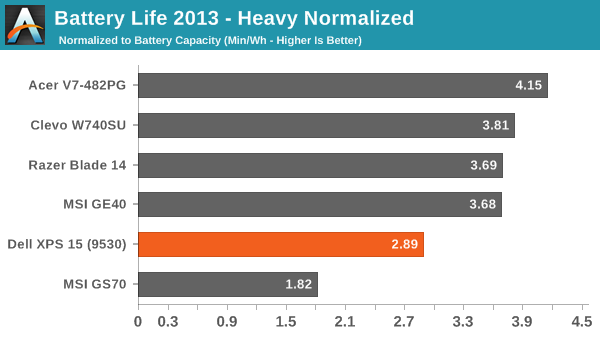
Thanks in a large part to the 91Wh battery, the XPS 15 is able to place quite far up our battery life charts in terms of raw unplugged time. It’s not quite so awesome when we look at the normalized Min/Wh figures, but while that can be useful information at the end of the day people are going to be using the battery they get with this laptop. We measured nine hours of battery life in our light workload, nearly 6.5 hours in our moderate workload, and around 4.5 hours in our heavy workload.
Interestingly, our new Heavy test using the Video app with a lower bitrate 1080p MP4 results in battery life that’s basically the same as our previous Medium testing – so with Video, playing a fullscreen MP4 while streaming 1MBps and loading Internet pages every ten seconds isn’t really any more taxing than playing back an MP3 while surfing the web. It appears Microsoft's Video app can scale content without incurring a power penalty, whereas when I was using Media Player Classic previously higher resolution displays often did worse (e.g. look at the XPS 15 results above).
Trying to game off the mains is a different matter, however, and even with a relatively large battery the XPS 15 only manages less than two hours while running Skyrim. (If you’re wondering, for testing gaming battery life, we use the Balanced power profile with the GPU set to “Prefer Maximum Performance”. Then we load up our Skyrim save in the town of Whiterun and let the system run until the battery is drained. The camera begins to pan around the character so it’s at least moderately demanding, though other games are certainly more so.)










152 Comments
View All Comments
Andrew Lin - Thursday, March 6, 2014 - link
can i ask how people fixed letterboxing in games? in certain directx11 games (bioshock infinite and anno 2070) i'm still being letterboxed when running at non-native resolutionJarredWalton - Friday, March 7, 2014 - link
I updated the Intel and NVIDIA drivers and I believe the Intel drivers then have an option to modify the scaling (it may have been present in the release drivers but it didn't work for me).Homeles - Friday, March 7, 2014 - link
We've had nothing but trouble with these and other XPS models at work. We must have gotten a bad batch -- a lot of dead HDDs out of the box.Conceptually, these are great computers. I love the screens on these. They're not bad to work on (read: repair), although changing one of the SO-DIMM sockets is rather annoying since you have to tear the whole thing down to get to it. I do dislike the slot load drive.
If it weren't for the myriad of hardware problems I've seen with these, they'd be a great product. Hope the Haswell version doesn't suffer the issues I've seen.
JarredWalton - Friday, March 7, 2014 - link
The new version is much easier to work with IMO -- no slot load drive, about eight hex screws to get to the internals, and if you get the SSD model, no HDD to speak of. But for a business, I suspect you'd want no GPU as it wouldn't be much use, and that's sadly not an option.jameskatt - Friday, March 7, 2014 - link
The Dell XPS 15 Haswell Edition is Dell's attempt to copy the MacBoo Pro 15-inch with Retina Display. Interestingly, it costs almost as much. But it fails in two major areas: 1) It doesn't have a PCIe SSD. Thus, its SSD storage is half as fast as Apple's. 2) It doesn't have Thunderbolt connectors. This means you cannot attach external PCI card cases nor get high speed storage as on the much more expandable MacBook Pros.Sad. But it is far better to run Windows on a MacBook Pro than to run Windows on a Dell attempt at a clone.
Dell should stop trying to copy Apple - albeit Apple makes tons of profit on its MacBook Pros. Dell should instead create inexpensive battle-tank PC Laptops that cost under $1000. It simply makes no sense to purchase a PC Laptop that costs more than $1000 - unless you are one of the few gamers.
JarredWalton - Friday, March 7, 2014 - link
There's nothing wrong with trying to copy one of the better designs out there, and Dell does enough different that it's not a major concern in my book. The PCIe SSD isn't a huge blemish, as random IO is pretty much bottlenecked by the NAND and sequential at 2X the speed only happens rarely other than for large file transfers. As for the Thunderbolt... well, it exists on Windows PCs, but it's rarely used right now. I'd say the vast majority of Windows users (including me) have never worried about the lack of a Thunderbolt port.Your remaining arguments are full of flaws. Look at a post above where one of the readers comments on running Windows full-time on a MacBook. GPU always on, limited driver updates/support, keyboard not designed around Windows, and a few other issues make that a non-solution for people that don't primarily run OS X. And if you think no one should buy anything more than a $1000 laptop, well, there's a huge market for sub-$1000 laptops it's true, but to get there the quality suffers immensely. I personally wouldn't even consider buying a laptop that didn't have a 512GB class SSD, which is $400 minimum right there. Give me a good display, enough RAM, a quad-core CPU, and then toss in a good battery with good keyboard and touchpad. That puts you at around $1300 bare minimum, and more likely $1800+. I'd expect to use such a system for a few years, where others might buy two $900 laptops and think, "I got a faster solution for less money", but the quality of all the parts ends up being far more important to me these days.
If money is tight, by all means get an inexpensive option, but don't knock the people and companies aspiring for something more. Part of the reason so many laptops suck these days is because of the race to the bottom we had for the past decade, so please let's not encourage OEMs to start that up again.
jphughan - Friday, March 7, 2014 - link
Nobody but Apple to my knowledge has bootable PCIe SSDs, because that's not a standard. PCIe is not designed to support storage directly, so Apple has had to bolt on some logic in order to make it work, but (as is typical with Apple), they've got a completely proprietary implementation. Have you ever wondered why you can't just buy a PCIe or miniPCIe SSD standalone, except for the ones that come from Apple laptops? That's why.And PCIe SSD storage being twice as fast is a benchmark fact, not a practical real-world one. I would bet that you couldn't reliably tell the two apart in a blind performance test.
As for Thunderbolt, the only things I've ever seen anybody connect to a Thunderbolt connector are displays and Ethernet dongles. Sure I agree that as a connector it has potential, but frankly it hasn't reached market penetration. I think it will turn out to be the modern-day FireWire port personally.
And Dell does make laptops under $1000. They just don't make ONLY laptops under $1000.
JarredWalton - Friday, March 7, 2014 - link
I think he's referring to M.2 SSDs that use the PCIe interface for higher performance? I know the Sony VAIO Pro 13 has something like this at least -- maybe just M.2 in general is faster than mSATA. But since it's mostly a benefit for sequential IO and that much sequential IO isn't common in day-to-day use for most laptop users, it's not a deal breaker by any means.Penti - Friday, March 7, 2014 - link
The current gen PCI-e SSD's do use AHCI and non Apple PC's do use the same SSDs (in M.2/NGFF form factor) so I don't know where he wants to go with that rant. Logic is in the SSD-controller which isn't custom for Apple by any means. Note here that the PCIe based Apple-Macs support Bootcamp/Windows just fine. At most a bootable PCIe solution requires a BIOS-rom and OS-drivers, but these solutions aren't PCIe to SATA bridges (controllers/adapters) any more, and firmware support is there regardless if it's Apples UEFI or say the Sony's. Shouldn't really be any different to run any other AHCI-drive. Form-factor differs here, but it's the same type of controller and hardware on the (Apple) SSD as with PCIe M.2 drives, which has come with at least controllers from Samsung, Marvell, and SF/LSI now.None AHCI-drives (NVMe) are a bit away because the software (OS) doesn't really support them yet, but neither is they offered.
Samus - Friday, March 7, 2014 - link
Wow. $1500 starting price for a Dell?Bold, Michael, bold.